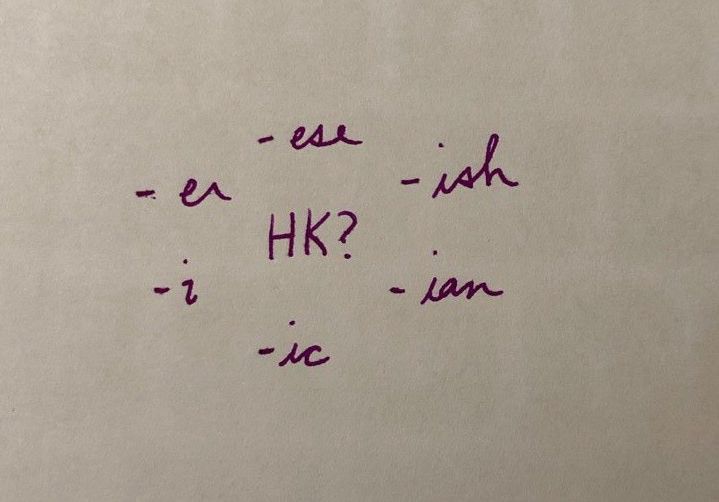
Hongkonger. Trans. 東京在住。青山返工的偽港區女子。 (she/her)
Are Hongkongers Hongkonger or Hongkongese?

The original text of this article was written in Cantonese a long time ago and posted on Medium .
I want to write about this today. It is said that I saw a topic about the English title (demonym) of "Hong Kong people" in Liandeng earlier, and the content mainly discusses the correct title of Hongkonger/Hong Konger and Hongkongese/Hong Kongese. Although I prefer Hongkonger myself, since the arguments used by both factions to attack each other are rather bizarre, I deliberately did a little research to see if there is any real basis for the allegations there. And my conclusion is that both sides are just talking nonsense, and there is no real evidence.
-ese stands for barbarian country?
There are those who oppose Hongkongese, saying that the -ese suffix will only be used in the appellation of people in some barbarian and backward areas. For example, when the British called people from East Asian countries such as China, Japan, and Vietnam as Chinese, Vietnamese, and Japanese, they thought that East Asians were barbarians. However, apart from some discussion forums in Hong Kong, I have not found this statement anywhere or in other languages. This statement does not explain why in Portugal and Malta in Europe, their demonyms are Portuguese and Maltese, nor does it explain why the demonyms in Milan, Genoa and other places are Milanese and Genovese.
Tracing the origin of the -ese suffix, we will find that it was borrowed from the Old French -eis suffix, which itself was derived from Latin. And this -eis has become the common -ais and -ois in French, such as français, anglais, japonais, chinois and other titles, which are not necessarily derogatory. Take Spanish and Italian, two Romance languages that are also derived from Latin, as examples. The -és and -ese (similar to English) suffixes they use to create demonyms are not necessarily derogatory, such as inglés/inglese , irlandés/irlandese.
And if this "barbarian theory" is true, I think before the Hongkongese protest for Hongkongese, the citizens and governments of other sovereign countries - especially the Chinese government - will protest long ago and ask the international community to use another name.
In fact, I don't like the name Hongkongese very much, because I subjectively think that the ending of /ŋiːz/ is "unlike English". Relatively, country names that do not end with /m/ and /n/ sound like -ese. I also estimate that everyone will make the whole /ŋ/ sound disappear when they read it, especially the people of Hong Kong themselves. Either way, however, arguments that are not supported by facts should not be circulated.
Cities only use -er, countries don't use -er?
On the other hand, those who oppose Hongkonger will say that most of the -er suffixes describe which city and region a person comes from, and will not be used for the country. Therefore, using Hongkonger is self-deprecating and describes Hong Kong as an ordinary city. But is this statement true?
In the 21st century, to search for the names of residents all over the world, just Google or wiki. And I found at least Luxembourger, Icelander and New Zealander three "national" demonyms using -er in Wiktionary. Are the three often mistaken for cities? No. Since the answer is "no", why should we belittle ourselves and think that Hongkonger will make people feel inferior?
The origin of the -er suffix is traced back to Proto-Germanic *warjaz , meaning inhabitant, defender. This word has spread to various Germanic languages, and it has become -er, -are, and only exists as a suffix, meaning the inhabitants of a certain place. And this means there is no limit, no distinction between cities or countries. For example, the German -er, in addition to the city name "Ich bin ein Berliner", can also be used to form demonyms such as Japaner, Italiener, Niederländer, etc. to represent nationals of different countries.
Although -er is used in many cities in English, such as Londoner, New Yorker, etc., does this mean that we need to impose "using -er means city, country does not need -er" itself does not exist, and there are already several What about the "rules" of the country's famous counter-examples?
Furthermore, when our identity is demoted by a suffix, is our identity too fragile? Is it too glassy?
What to do then?
Although I obviously think Hongkonger sounds better, my own opinion is that no one has the right to decide that Hongkonger and Hongkongese are the "correct" names. As mentioned above in Luxembourg, there is also Luxembourgian, which is less used than Luxembourger, so it can be seen that there is not only one title.
Speaking of which, I suddenly thought of an interesting alternative - Hongkongian. First of all, the -ian suffix is common enough to be used in countries and cities. It also coincides with the Cantonese pronunciation of "Hong Kong people". Problem solved!
Like my work?
Don't forget to support or like, so I know you are with me..
Comment…